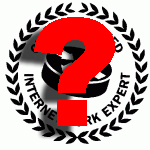 What does it actually mean to have passed the Cisco Certified Internetwork Expert exam and get those ‘digits’ (your CCIE number)?
What does it actually mean to have passed the Cisco Certified Internetwork Expert exam and get those ‘digits’ (your CCIE number)?
Fame, glory, and billions of dollars await! Well…
Attaining Cisco’s CCIE is seen as somewhat of a panacea – it’s the ultimate goal of many network engineers, and is widely considered to be the mark of the best of the best; a career peak, perhaps. Juniper’s JNCIE program while much newer and thus so far achieved by fewer engineers, has tried to position itself at similar lofty heights, but I’m not sure it has gathered the almost mythical status held by the CCIE and its terrifying lab exam.
I’m always curious therefore about people’s attitudes towards this great certification, how it impacts their perception of those who have passed, and whether that impact is justified.
With that in mind, here are a few pros and cons I can think of to having passed the CCIE exam (Cisco, by the way, does not ever want you to say “Joe Smith is a CCIE” – see Section 7 of the CCIE Logo guidelines).
The Good
- You sort higher in the pile when you apply for a job;
- You are likely to be paid more because you have a desirable certification;
- Cisco Partners need CCIEs to maintain partner status, so you’re ‘useful’ to them (enhances your employability);
- You can buy stuff with CCIE logos on it (yay!);
- People tend to listen to you a bit more because you appear more credible;
- Additional access or perks at events like Cisco Live (a very small benefit);
- You achieved something difficult and cool! Congratulations!
The Bad
- Some people assume that CCIE means you know absolutely everything about every Cisco technology out there. When they discover that’s not true, they may be disappointed, and start disparaging your CCIE certification (and you);
- CCIE does not mean you are the shizzle. Your actions prove that you are the shizzle. Until then, you’re just another numpty with a certification;
- Some people resent others having certifications and use it as an excuse to try and trip you up to prove that they, without certifications, are just as valuable. And I’m sure they are, but as I say, their actions should prove it, not their ability to catch somebody out;
- Some people assume you will act as a Cisco sales person and not be able to appreciate or recommend any other vendor’s equipment;
- You have to take that stinkin’ recertification exam every 2 years 😉
It should be obvious that the good points far outweigh the bad. I believe that the CCIE program is extremely valuable both to the individual engineer, and to any partner that employs them, and I would not for one second want to be without mine. But as somebody who has passed the CCIE lab (I mean “who is certified under the CCIE™ program, CCIE™ No.6727“), I will share this with all due humility:
A CCIE is a network engineer who knew how to answer the specific questions that were asked on the day they turned up for the written exam and the lab.
And that’s it.
I’m not putting the certification down by any means – it is HARD, and passing is definitely up there in the list of my lifetime achievements, just as I’m sure it is for many people. Those questions you knew the answer to – they were difficult! But like any exam, the test setter cannot cover every scenario, so they only ever are able to test a subset of the available topics. So without question, if you pass the lab exam, all credit to you for your achievement, because it was a big one.

But here’s the thing – having the cert doesn’t make you a network super stud. It annoys me when I see people who are arrogant about believing they are right simply because they have the ‘digits’. I’ve even heard the CCIE certification being used as an argument by somebody as a reason why their opinion shouldn’t be questioned, not to mention the power play of “Well, I’m a CCIE so this is how it’s going to be done.” I mean, WHAT?!
Your opinion is valuable because it’s good, not because you have a CCIE. If I’m working with you on a team, it doesn’t matter if you have a certification or not:
It’s what we DO that determines our value.
Some of the best engineers I’ve ever met were not in a position to follow the certification path through to CCIE. There’s an important lesson there for those who think certifications define the person.
I Passed First Time!
As shared in my CCIE Story I did, as it happens, pass the lab on the first attempt, and that makes me feel happy (not least because I didn’t have to go back and put myself through that nightmare again). Funnily enough though, on my resumé, it doesn’t say “CCIE (passed first time)”, because (a) that would be unbelievably arrogant and (b) it doesn’t prove anything. It’s not something I normally share in conversation, unless asked (though unfortunately there’s such a mystique surrounding the number of Lab attempts you took that a conversation about CCIE almost inevitably ends up with that question at some point).
The reality is that you can either walk the walk, or you can’t. Passing the lab on your third try, say, doesn’t make you a less good engineer than somebody who passed it on their second. And passing it, period, does not make you a deity. As with any exam, knowing the configuration commands to get you through the test does not mean you understand the protocols.
Ethan Banks spews a little well deserved vitriol on this subject in post on his Packet Pushers blog, and you might enjoy reading his rather eloquent take on this issue.
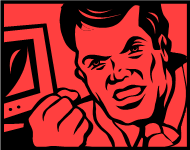
Tough Office Environment
As a side note about questioning opinions, when I was working for an employer in the UK, our office was feisty to say the least. Whiteboard sessions were common, arguments were hard and fast, and if you made a statement about something technical, you had better be able to defend its validity and explain why you were right. Visitors from other offices were regularly shocked by how aggressive we all seemed to be towards each other, but the reality was quite the opposite. We were a very tight team, and we all recognized that everybody had something to contribute to each discussion. We respected each other deeply, but nobody was held up on a pedestal with an unassailable opinion – every opinion, even from a subject matter expert (or this case, let’s say a CCIE), was subject to cross-examination. The up side of this is that we all learned from one another in the process of querying statements and explaining ideas, and – more importantly – we ended up with better solutions to our customers’ problems. And we could do all this without any offense being taken, because we all understood that it’s what you do that determines your value, not what certification you might have passed.

Happy Birthday!
I have many memories of having a birthday where I was asked “How does it feel to be <x> years old?” And my stock response (one that seems to be fairly widespread) would be along the lines of “It feels kind of like it did yesterday.”
Are people stupid the day before they take the CCIE lab, and super smart the day after they passed it? Of course not. They had attained the level of knowledge required to pass the lab BEFORE they had the certification. And the same can apply to people who have not yet passed the lab. The CCIE certification does not define you; a lack of CCIE does not define you either.
There Are Too Many CCIEs Now
Are there? I’ve heard, apparently, that the CCIE is becoming worthless because there are so many of them now.
Well, I agree that the CCIE numbers are rising much faster than before. Brad Reese has a number of interesting articles on CCIE counts worldwide, and in his January 2012 Cisco CCIE Count article, he notes that:
“Historically the run rate over the last ten years is around 200 new CCIE a month. In the last eleven months the run rate was 350 a month.”
Is that a bad thing? Is the exam getting easier? Are more people cheating? Or are we simply seeing more candidates coming forward as a result of the huge technological growth in some regions of the world? Brad’s Worldwide CCIE Count table reveals some interesting statistics. From 2005 to 2010, the USA increased its pool of CCIEs by 32% with North America as a whole increasing by 41%. Compare that to, say, South America (+87%), Asia (+120%), Central America (+213%) or the Middle East (+333%). Maybe we’re just seeing (parts of) these regions catching up in Cisco terms.
And, from what I could find, it looks like both the written 350-001 and the lab itself are still only available in English. Many of these people are taking and passing the CCIE in a foreign language!

Is the CCIE Still Relevant?
Heh. Depends what you consider ‘relevant’ to be. Ivan Pepelnjak on his ipspace.net blog (previously known as ioshints.info, which in turn spawned the hilarious junoshints.info – oh wait, that was me) made some interesting points in his post “Does CCIE Still Make Sense“, and I’d recommend reading that article, and in fact subscribing to his blog if you do not already. It should be noted that in 2008, Ivan, who is certified under the CCIE™ program, CCIE™ No.1354, decided not to recertify his CCIE and instead has since chosen to become a CCIE Emeritus, which keeps his certification in the food warmer (so to speak), ready to be re-activated if he chooses.
Earlier in this post I asked whether somebody is stupid the day before they take the lab and super smart the day after they pass it, and Ivan is a great example of the corollary to that – if you’re super smart after passing the lab, are you suddenly stupid if you let it lapse, or go to Emeritus status? Of course not. Well ok, if you have the option to do so, you might be foolish to let it lapse rather than go to Emeritus status, but again, this demonstrates that the certification does not define the person.
Should I Even Bother Then?
Yes; without hesitation. When you pass it will be one of the high points of your life. Employers love it, and as I said earlier the good points outweigh the bad by a long way. But passing the CCIE lab is not the end of the road (it’s not like you stop learning once you pass the lab), and it’s no panacea. It’s just another (significant) step along the way. Keep walking, my friends!
Email Signatures
This is where I alienate half of my readers, but please do bear with me if you would be so kind.
I do not have my CCIE certification listed in my email signature (or any of the other certs I have). You know why? Because it doesn’t have any impact on what I need to say to people. Are my words somehow wiser because I put “CCIE” at the bottom of the email? Absolutely not. If somebody thinks I’m wrong, should they bow down and stay quiet because of those letters? No! Argue with me; I’ll probably argue back, but I know that I make mistakes just like the next person, and if you convince me I’m wrong, I’ll admit it. The CCIE certification is awesome, but it’s no silver bullet. Just like in my tough UK office example above, we should always question what we’re told. So over time I have come to believe that putting a certification (or its logo) in my signature has little value to me.
So, if your email signature lists certifications (including perhaps your CCIE number), I’m curious if you can remember why you put it there, and what value it brings from your perspective? Why do people need to know what certifications you have? I’m open to the idea that there are good reasons for it, mind you. I know some companies insist that their employees flaunt their certs, so it isn’t a choice (I guess the intent is to impress the customers with how awesomely qualified their employees are); I see marketing value in that. But maybe think about internal emails – perhaps to internal peer support groups. Do you have the same sig there too? I’d love to hear other perspectives on this, especially if you strongly believe that certs should be in signature blocks.
Of course, I’m a tiny bit of a hypocrite because I do mention that I am a CCIE on my About page, and I do put it on my resumé. I’m often introduced by others as a CCIE as well, but I would rarely introduce myself that way. And I’m being terrifically unfair because you work your backside off to get the thing, then here’s me saying not to tell anybody about it! What happened to pride? I’m not saying that a CCIE is something to be hidden – use it as part of your introduction or bio – but then let’s move on. I don’t see the need to shove it in people’s faces all the time.
Blowhard
Think I’m wrong? Have some more Pros and Cons to share? Want to agree, or share your own differing opinions? Hit me up in the comments below please; I’d love to hear what you think. Maybe you can convince me to change my mind about something!

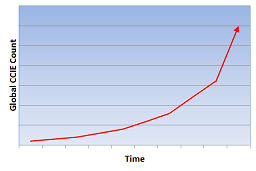

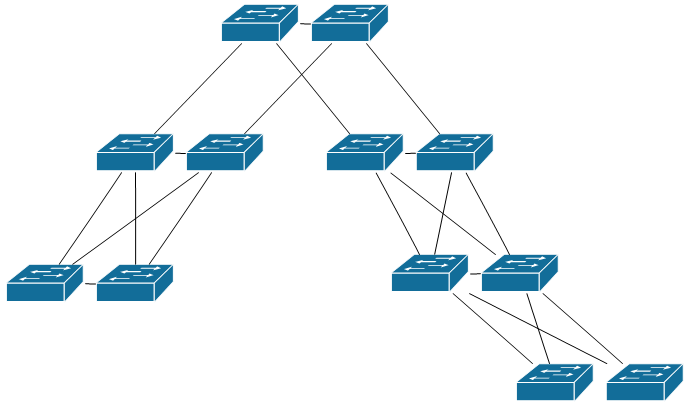
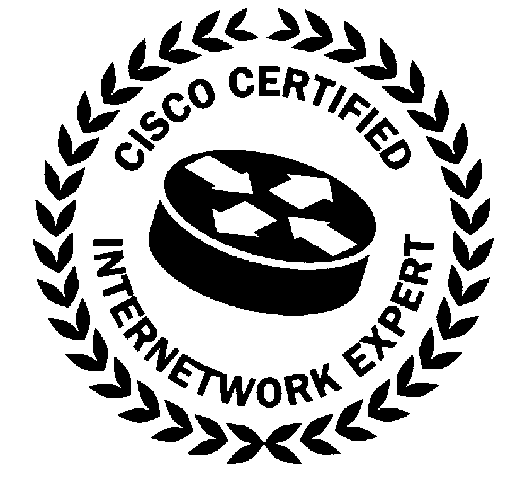
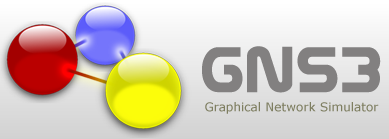
Just curious as to why they frown upon “Mr. Smith is a CCIE?” vs. Mr. Smith, CCIE #1234?
What’s the rationale behind that? Any idea?
I have no idea. I guess Cisco not wanting CCIE to be used that way is a little like Google insisting that they aren’t a verb and you shouldn’t “google” something. What’s a killer is that you have to agree to those usage terms, yet I have to think they’re broken every day.
Maybe I should ask for an explanation. Hmm.
Re-reading, I’m actually pretty close to the money it seems. The guidelines say “Since it is a trademark, it should be used as an adjective and never as a noun.”
Now you know.
Yes it is in my signature right now with the number. But I did just pass last night so I might take it off after a while 🙂
You are forgiven 😉
I thought this was a very worth while article to read for any network professional, so thank you. –Paul
Very interesting article indeed, especially for those aspiring to attain the CCIE™ Certification. I haven’t got it yet but I’ll go ahead and use it in my signature. Hehe
Alex Umeh
Aspiring CCIE
Great Article.Very Inspiring and yet realistic.Some things have been bugging me these days.I’m on my way to complete my CCNP but still i couldn’t find any job related to networking.What should I do? Go for the ultimate i.e, CCIE so that employers cannot resist or should i search for job first?Important thing to mention here is that it is not my incompetence in getting the job but the third world country i’m living in 🙁
I am not a network or IT professional; I do NDT (nondestructive testing). However, this is a great article, as well as links! MY field is similar in that there are some “endgame” certs that carry weight (good and bad, just like stated above). It was refreshing to hear this perspective, it goes for IT and NDT as well (maybe even more so in NDT, since certs are given out like candy sometimes without merit. Unlike when an unqualified guy does a network and it wont work… a certified but unqualified technician will do the job, and no ones the wiser– happens all the time, sorry to say.)
Its easy to know something, just learn it; the hard part is understanding.
Thanks for the read!
I use my number only when corresponding with customers in an email. For my function it seems important to many customers to know and remember their consultant is a CCIE. Does it really mean anything – not to me. It does to our sales force. To one point you make – an arrogant self absorbed CCIE is mostly useless to me, that would include myself if I ever go down that road. I know what I know and I am aware of areas where I have gaps. I also know I have gaps in areas I don’t know about…. yet. That is with decades of experience. Good write up.